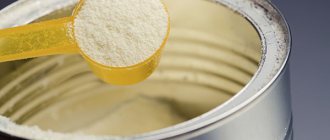Good day to you, wonderful readers! Many mothers are familiar with this problem: the child does not poop. Women who have not given birth cannot understand how keenly mothers discuss this issue... But the situation is really difficult, draining parents’ nerves, strength and money.
I've encountered this situation twice already. After the birth of my daughter and after the birth of my son. After the birth of my daughter, I listened to the pediatrician’s recommendation, and we stayed on Microlax for up to 3-4 months. And with my son... We went exactly the opposite way.
In fact, the main question that mothers ask is how long can a baby go without pooping? When should you sound the alarm, resort to some external means and run to the doctor?
I’ll note right away that we will only talk about children on breastfeeding. This is a fundamental point. The body of artificial babies functions according to a different principle.
Current trend
Pediatricians say that the problem of constipation is especially acute today. It appears in newborns and schoolchildren, which means it cannot but attract attention. This trend is associated with poor nutrition and diet, as well as poor ecology. Not only doctors are worried; young mothers are the most worried. If a child does not poop for 3 days, this is an alarm bell that cannot be ignored. Please remember that deadlines vary from person to person. If the baby is worried, cries and kicks his legs, then there is no point in waiting until the specified time has passed. Otherwise, perhaps we are talking about the individual mode of intestinal function.
What affects the quantity and quality of feces?
- Feeding method: breast or bottle with formula.
- Diet of a mother who is breastfeeding.
- Features of mother's milk: degree of fat content.
- A variety of mixtures for artificial grass.
- The presence or absence of intestinal disorders.
- Use of medications by the baby or nursing mother.
- The surrounding psychological atmosphere (especially for children after one year).
The intestines of newborn babies are in the formative stage. The baby’s body learns to do things that are new to it: to accept and process unusual food. He trains, adapts to various changes in food after intrauterine life. All this can cause the baby not to poop for three days or more. At first, his stool may be markedly irregular: sometimes the child defecates after each feeding within a day, and sometimes the newborn does not poop for a whole week. The main thing is that the baby does not feel bad.
Rare stool while breastfeeding
If a child does not poop for 3 days, this in itself is not a signal for an immediate response. First you need to analyze the situation. The child may simply not receive enough milk and experience hunger, then feces will not be formed in the required quantity and with the usual frequency.
So, get yourself a notebook and write down when the baby went to the toilet and how he feels between these events. If the child does not poop for 3 days, but at the same time gains weight normally and does not experience discomfort, then we are talking about complete absorption of milk. You don't need to do anything other than what you already do every day.
Such conflicting data
When my eldest daughter suddenly stopped soiling her diapers at one month, I asked the pediatrician for his opinion. The pediatrician answered very clearly: the normal frequency of stool for an infant is once a day. If there is no stool for two days, you need to do a “microlax” (children’s enema).
At the same time, I studied information on the Internet and learned that according to WHO, a baby may not poop for up to 7-10 days. These data have been confirmed by many resources. But they were somehow dry, unreal... Nobody believed in them.
So I made some compromise. I started using Microlax every three days. And until 3-4 months, my daughter did not poop on her own at all. Fortunately, then everything returned to normal and all the microenemas were forgotten.
Poor older children! How many bumps we get on them!
Information for parents
When a baby is born, its intestines begin to work. The fecal matter that has accumulated over the entire period of pregnancy leaves it. They are black in color and are called meconium. At the same time, the baby begins to drink colostrum, which starts independent digestion. Finally, on the third day, when the mother produces milk, the intestines are completely ready to absorb it.
This wonderful drink is food and drink, it contains all the necessary enzymes, vitamins and minerals, as well as antibodies that are so important for the baby. Moreover, its composition is not static. At first, the milk is fattier, but at the same time it has a laxative effect. Therefore, if a small child does not poop for 3 days, then this should be the reason for contacting the pediatrician. Approximately 2-3 months after birth, the milk changes, it becomes more liquid. And the baby’s tummy reacts to changes in a unique way.
Normal limits
A busy pediatrician is not always able to tell the mother about the nuances of breastfeeding and the functioning of the child’s digestive tract. Therefore, there are usually more than enough reasons for concern. Let's outline the main points that will help you correctly diagnose your baby's condition.
- If a child poops once every 3 days, but the stool is liquid, yellow in color, without green spots, this will only indicate the individual cycle of his digestive system.
- In the first months after birth, the baby usually goes to the toilet more often, this is due to the properties of mother's milk. However, if a child (3 months) does not poop for 3 days, then this is completely normal. The fact is that at this age a decrease in stool occurs. Now the intestines can easily accumulate feces for 3-5 days before their amount reaches a critical mass and emptying occurs. And again, it must be emphasized that you need to observe first of all the baby’s reaction.
How often should a one-month-old baby poop?
Many pediatricians say that a child should poop as many times a day as he has eaten (up to eight times a day). However, today most pediatricians have come to the conclusion that each infant has its own bowel movement routine, since everyone’s digestive system develops differently. Some babies poop 8 times a day, some 2 times a day, and some even 1 time in 2 days. For example, babies who are fed breast milk defecate more often than babies who are bottle-fed. On average, the stool parameters for a one-month-old baby are as follows:
- In children who consume breast milk, the volume of stool is approximately 20 grams.
- In artificially fed children, the volume of feces is approximately 30 grams.
- Children who drink their mother's milk have yellow stool that smells like sour milk.
- Artificial babies have yellow or brown stool and a rather pungent odor.
If a child suddenly loses the established bowel movement schedule, then parents need to immediately react and take action.
Alarming symptoms
Observe exactly how the baby poops. 2-3 days is a normal period, but if the baby is worried, strains and cries, turns red, and wreaths swell on his forehead, then this indicates that it is time to provide him with the necessary help. Additional symptoms include a hard belly and tenderness. When you try to feel it, the baby cries and tightens its legs. In this case, it becomes clear that not everything is going smoothly with digestion.
The very first solution that comes to a mother’s mind is an enema. However, you should resort to her help only in emergency cases. It is enemas that cause the most persistent problems with microflora, as well as constant constipation. Therefore, this procedure is carried out only as prescribed by a doctor.
How to help?
The main thing here is to do no harm. Be sure to keep a diary and write down when your baby poops. 3-4 days is a long but acceptable interval. If you give the body a chance to adjust its digestive processes, then after some delay the stool will be restored again. A light massage of the tummy in a clockwise direction, a warm bath and the “bicycle” exercise can help. In addition, from the fourth month of life you can start giving complementary foods. It could be prunes in jars. Rare bowel movements in and of themselves are not a cause for concern. The body is now figuring out how much it can store before it has a bowel movement. The main thing is the normal well-being of the baby.
If the problem does not go away with age
Infant problems are a thing of the past, potty training is going well, and suddenly there’s a new problem. From one and a half to three years, the baby begins to defend his independence, and one of the reasons for constipation may be a protest against the potty. In this case, you need to reduce the pressure on the baby; it is better to use the example of fairy-tale characters to show that going to the potty is good and correct.
However, it also happens differently. If a child (3 years old) does not poop for 3 days, perhaps the reasons are that he experienced pain or discomfort once, and is now trying to avoid it. In this case, first of all, you need to regulate the baby’s nutrition. Add pumpkin or carrot juice 1 hour before meals, a decoction of prunes. Be sure to remove candies and sweets, cakes and excess bread from the menu. But vegetables and fruits, on the contrary, should be on the menu every day. Children usually don’t like vegetables, so you’ll have to hide them in casseroles, cutlets or puree soup. At night, give your baby one-day kefir (you'll have to make it yourself).
Little tricks for mom
It is best to lead by example. Allow your baby to come into the toilet with you, so he will understand that this is a normal process. It may be worth changing the potty, which the child associates with unpleasant sensations. Try to write a fairy tale with your child about a cat who learned to go potty and now he really likes it. During potty sessions, give your child plasticine and cardboard on which he can roll balls and smear them. It's distracting and calming. By regularly following these rules, you can completely solve your digestion problem without the use of drugs.
A few words about the causes of stool retention
- Errors in nutrition.
Both the mother and the baby she is breastfeeding need to eat properly. The mother should do the following: reduce the amount of foods in her diet that contribute to the baby’s stool retention. These products are: rice cereal, butter and flour, bananas, strong tea and coffee, fatty, fried, spicy, smoked, chocolate. Pay attention to how much your child eats. The baby suffers from constipation if he overeats, so you should not offer him the breast for any reason. Don't introduce complementary foods too early or too quickly. Children prone to constipation can start giving complementary foods with vegetable and fruit purees. Artificialists should not change mixtures frequently and abruptly. After changing the usual mixture, bowel movements are often disrupted.
- Lack of fluid.
If the baby is fed breast milk, he does not need water, he will receive the necessary amount of food and drink. If you breastfeed your baby on demand, especially in hot weather, he will have enough fluid. Formula-fed babies can receive extra water to drink, especially if they have problems with bowel movements. Babies should drink enough fluids after starting solid foods.
- Lack of physical activity.
Physical education is very important for children of any age. It helps strengthen muscles and also promotes normal intestinal motility. Exercises should be done with infants. Any physical activity should be encouraged. Give the baby the opportunity to move freely, dress him in clothes that do not restrict the freedom of his arms and legs, encourage him to crawl.
- Helminths.
The possible presence of such a problem as the presence of parasites in the child’s body cannot be discounted. Timely examination will help to avoid many health problems.
- Diseases of the gastrointestinal tract.
Intestinal obstruction is especially dangerous. It is recommended that every child with suspected constipation be seen by a doctor to rule out the presence of diseases.
- Birth defects.
In rare cases, the baby suffers from some congenital pathologies, such as Hirschsprung's disease (problems with the colon caused by underdevelopment of the nerve plexuses).
- Psychological factor.
This problem exists in children who can already go to the potty on their own. Often, for one reason or another, the baby is afraid to go big. These may be unpleasant memories of a painful previous bowel movement, discomfort from visiting a shared toilet in the garden or nursery, conflict and stressful situations in the family, etc. Attention and support from loved ones will help the baby cope with his fears.











